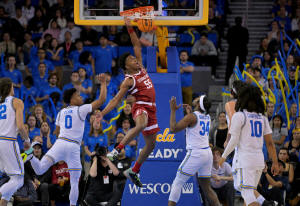|
Two former college athletes filed the complaint
against the NCAA, which is the governing body for U.S.
intercollegiate sports, and a group of its member conferences.
The lawsuit alleged an unlawful conspiracy to bar cash awards
for academic success.
The lawsuit builds off a U.S. Supreme Court 9-0 ruling in 2021
that said it was illegal for the NCAA to have blocked schools
from offering education-related benefits, including an award of
up to $5,980 a year to student athletes. More than 50 schools
have since started to offer those payments.
"This is part of the continuing effort to bring justice to the
athletes who have been deprived of the ability to share in the
revenues they generated by the NCAA," a lawyer for the
plaintiffs, Jeffrey Kessler of law firm Winston & Strawn, told
Reuters on Tuesday.
Representatives from the NCAA did not immediately respond to
requests for comment.
The suit seeks to represent a class of "thousands" of current
and former student athletes who competed on a Division I team
starting in April 2019, before the academic awards were
permitted.
Division I is the top level of college sports in the United
States, including big money makers football and basketball as
well as many other sports. The complaint said the NCAA, its
league conferences and member schools "generate billions of
dollars a year in revenues from Division I sports."
The two named plaintiffs are Chuba Hubbard, who played football
at Oklahoma State University, and Keira McCarrell, a former
track and field runner at the University of Oregon and Auburn
University.
The plaintiffs "did not receive the academic achievement awards
that they would have received in a competitive market," the
complaint alleges.
The case is Hubbard et al v. National Collegiate Athletic
Association et al, U.S. District Court, Northern District of
California, No. 4:23-cv-01593.
(Reporting by Mike Scarcella; editing by Leigh Jones and Bill
Berkrot)
[© 2023 Thomson Reuters. All rights
reserved.]
This material may not be published,
broadcast, rewritten or redistributed.
Thompson Reuters is solely responsible for this content. |
|





